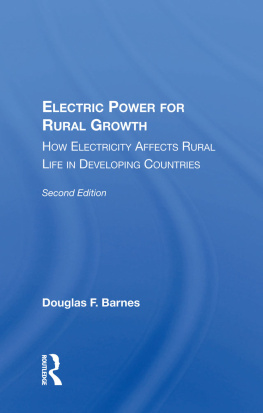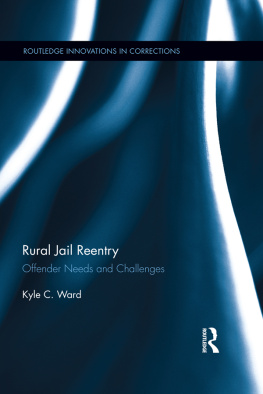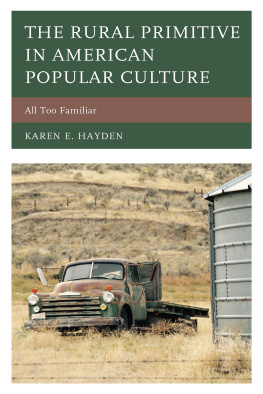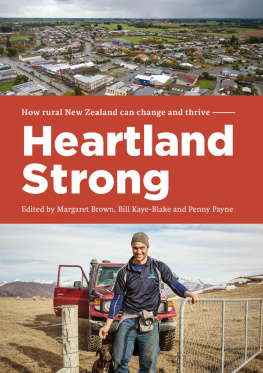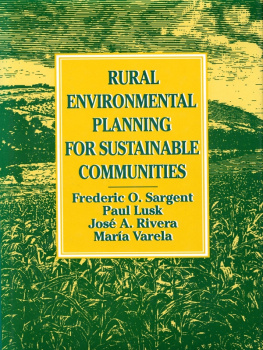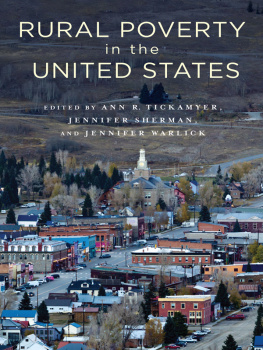
Rural Society in the U.S.: Issues for the 1980s
Also of Interest
Alaska's Rural Development, edited by Peter G. Cornwall and Gerald McBeath
Rural Education: In Search of a Better Way, edited by Paul M. Nachtigal
Poverty in Rural America: A Case Study, Janet M. Fitchen
What Happened to Fairbanks? The Effects of the Trans-Alaska Oil Pipeline on the Community of Fairbanks, Alaska, Mim Dixon
The Family in Rural Society, edited by Raymond T. Coward and William M. Smith, Jr.
The Myth of the Family Farm: Agribusiness Dominance of U.S. Agriculture, Ingolf Vogeler
Politics in the Rural States; People, Parties, and Processes, Frank M. Bryan
Education in Rural America: A Reassessment of Conventional Wisdom, edited by Jonathan P. Sher
Rural Education in Urbanized Nations: Issues and Innovations, edited by Jonathan P. Sher
Women and the Social Costs of Economic Development: Two Colorado Case Studies, Elizabeth Moen, Elise Boulding, Jane Lillydahl, and Risa Palm
The Family in Post-Industrial America: Some Fundamental Perceptions for Public Policy Development, edited by David P. Snyder
Available in hardcover and paperback.
Rural Studies Series
Rural Society in the U.S.: Issues for the 1980s
edited by Don A. Dillman and Daryl J. Hobbs
Must rural Americans pay the price of urban progress and modern lifestyles? How will the increased pressures of the 1980s affect those who live and work in rural communities? In addressing these overriding questions the authors of this book take a serious look at such issues as who will operate our farms and how those farms will meet rising demands for food, how higher energy costs will change life in rural areas, the current and future needs of rural families and their communities, who in fact lives in these communities, and what can be done about escalating rural crime and recent social changes that have disrupted the traditional patterns of rural society.
Because the United States is an interdependent system of rural and urban, of providers and consumers, these issues are vitally important to all-scholars, policy makers, and citizens alike. The contributors bring us up to date on the contemporary rural scene and offer suggestions for research essential to intelligent decision making about the challenges and problems the 1980s hold in store for rural America.
Don A. Dillman is a professor in the Department of Sociology and Extension and Research Sociologist in the Department of Rural Sociology at Washington State University. He is author of the book Mail and Telephone Surveys: The Total Design Method and many other publications on survey methods and rural quality of life. Daryl J. Hobbs is director of rural development and professor of sociology, rural sociology, and family and community medicine at the University of Missouri, Columbia. He is a past president of the Rural Sociological Society and is the author of numerous publications on rural development issues.
THE RURAL STUDIES SERIES
of the
Rural Sociological Society
EDITORIAL BOARD
Chairman, David L. Brown, USDA/SEA/CR, Washington, D.C.
Howard Newby, University of Wisconsin
Frank W. Young, Cornell University
Kenneth P. Wilkinson, Pennsylvania State University
James J. Zuiches, National Science Foundation and Michigan State University
Denton E. Morrison, Michigan State University
J. Steven Picou, Texas A&M University
Advisory Committee to
Rural Society in the U.S.: Issues for the 1980s
Stan Albrecht, Brigham Young University
Gladys Bowles, U.S. Department of Agriculture, University of Georgia
Alvin Bertrand, Louisiana State University
William Heffernan, University of Missouri
Rex Warland, Pennsylvania State University
James J. Zuiches, National Science Foundation, Michigan State University
Ex-Officio Members
William Flinn, Ohio State University
Edward Moe, U.S. Department of Agriculture, Science and Education Administration
Rural Society in the U.S.: Issues for the 1980s
edited by Don A. Dillman and Daryl J. Hobbs
First published 1982 by Westview Press
Published 2019 by Routledge
52 Vanderbilt Avenue, New York, NY 10017
2 Park Square, Milton Park, Abingdon, Oxon OX14 4RN
Routledge is an imprint of the Taylor & Francis Group, an informa business
Copyright 1982 by Taylor & Francis
All rights reserved. No part of this book may be reprinted or reproduced or utilised in any form or by any electronic, mechanical, or other means, now known or hereafter invented, including photocopying and recording, or in any information storage or retrieval system, without permission in writing from the publishers.
Notice:
Product or corporate names may be trademarks or registered trademarks, and are used only for identification and explanation without intent to infringe.
Library of Congress Cataloging in Publication Data
Main entry under title:
Rural society in the U.S.
(Rural studies series of the Rural Sociological Society)
Includes index.
1. United StatesRural conditionsAddresses, essays, lectures. 2. Sociology, Rural
United StatesAddresses, essays, lectures. I. Dillman, Don A., 1941- . II. Hobbs,
Daryl J. III. Series.
HN59.2.R87 307.7'2'0973 81-19858
ISBN 0-86531-100-5 AACR2
ISBN 13: 978-0-367-28640-8 (hbk)
ALVIN L. BERTRAND
The Rural Sociological Society, sponsor of this volume, is nearing its fiftieth birthday-an appropriate moment to take stock and plan for the years ahead. This volume represents the best thinking of members of the society regarding the future of rural society in the United States. It has been put together by experienced and knowledgeable editors and authors carefully chosen to accomplish what was obviously a challenging assignment. The caliber of the completed work provides unmistakable evidence that a relatively young profession is concerned not only about research but also about the public consequences of it.
This volume will have greater meaning for the reader who has some awareness of the history and development of rural sociology in the United States. As an independent discipline and profession, rural sociology has the distinction of being a truly American invention. Its origin can be traced to the early years of this century when rural problems reached alarming levels. The plight of ruralites was highlighted in a report prepared by members of the Commission on Country Life (appointed by President Theodore Roosevelt in 1908) after a nationwide study. A significant subsequent development was that several individuals with university training in sociology became aware of and interested in rural social problems. These early pioneers, whose names appear in the various histories of the discipline, called themselves rural sociologists and defined their professional effort as the development and application of concepts and theoretical models for the express purpose of improving the life and well-being of rural people. In their applied emphasis, they broke away from the social-philosophical approach that had dominated sociology up to that time. A pragmatic approach has continued to be the hallmark of rural sociology research and practice.


